Best Food for Dogs with Arthritis
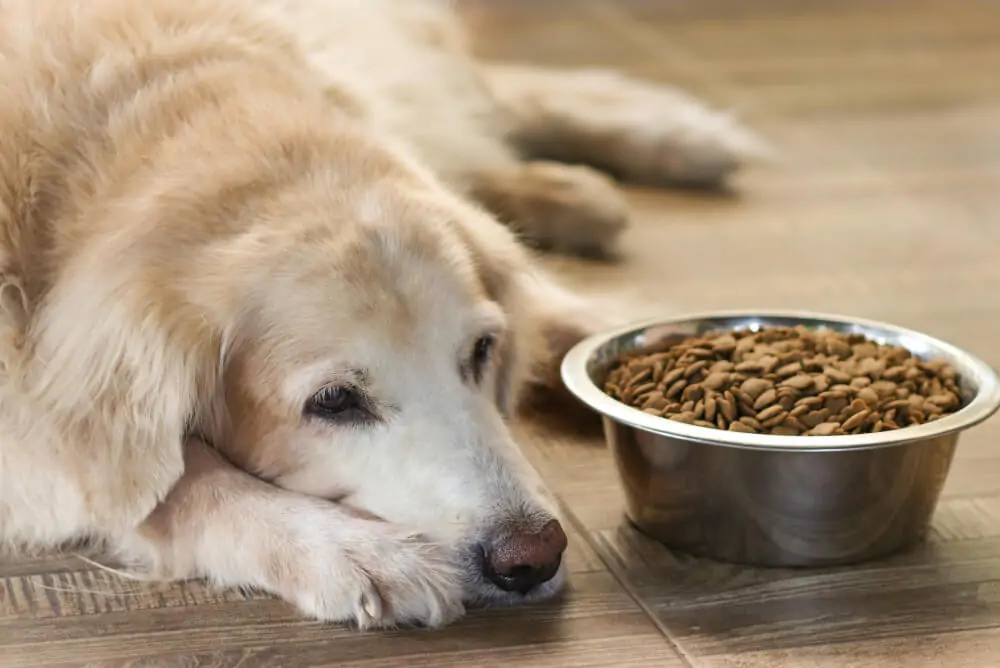
DogFoodAdvisor is reader supported See how
All reviews are 100% impartial but if you buy using links on this page, we may earn a referral fee.
What’s the best dog food for arthritis?
When choosing a food for a dog with arthritis, it’s important to focus on high-quality ingredients that promote joint health and provide optimal nutrition.
Look for foods that contain glucosamine, chondroitin sulfate and omega-3 fatty acids via fish oil or an algal source.
If your arthritic dog is overweight, consider a dog food formulated for weight management to reduce strain on the joints. Maintaining a healthy weight is crucial for managing arthritis.
Avoid any dog foods which contain excessive fillers, artificial additives, and potential allergens, as they can exacerbate inflammation and discomfort.
Here you will find our recommendations of the best dog foods for arthritis which all meet the criteria described above.
You’ll also learn the answer to each of the 6 most frequently asked questions we get asked about dogs with arthritis.
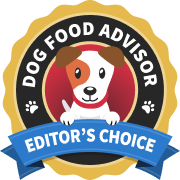
Best Food for Dogs with Arthritis April 2024
Here are The Dog Food Advisor's best dog food brands for Arthritis for April 2024.
-
1. Victor Purpose
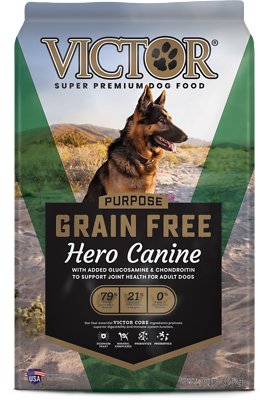
The Senior Healthy Weight is one of 6 recipes included in our review of the Victor Purpose product line.
Victor Purpose Senior Healthy Weight derives the bulk of its meat protein from beef meal. Dry matter label analysis reveals the recipe contains 33.3% protein, 18.8% fat and 39.9% estimated carbs… with a fat-to-protein ratio of about 56%.
This nutrient-dense senior dry dog food recipe is made with premium-quality beef, chicken, pork and fish meals so is ideal for older dogs that are less active, and adult dogs that need to reduce overall weight. Glucosamine and chondroitin in the dry dog food promotes long-term joint health and L-Carnitine aids in converting fat to energy for lean muscle development.
Read our review of the full Victor Purpose Dog Food (Dry) range here
Main Ingredients Beef meal, whole grain brown rice, whole grain millet, grain sorghum & chicken fat (preserved with mixed tocopherols) Type Grain-free Protein Percentage 33.3 AAFCO Standards Maintenance Best For Dogs and senior dogs Sample buyer review...
Read more buyer reviews at VictorFood.com"My husband has been giving extra treats and food to our 12 year old girl. She has put on more weight over the past few years. The extra weight has caused arthritis in her hips. She refused this food at first but after three days she is eating it without having to mix her other food with it. It appears to be a very good quality kibble."
-
2. Nulo Freestyle
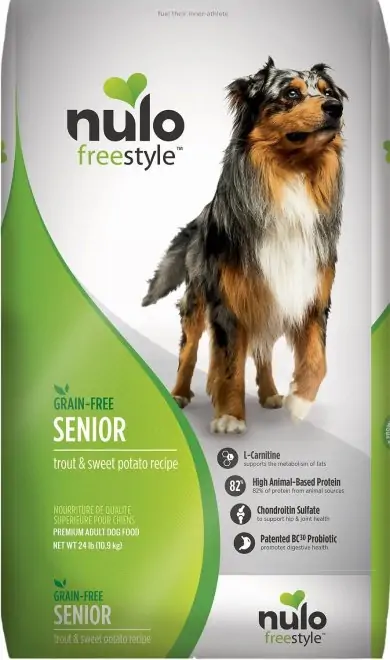
The Senior Trout and Sweet Potato recipe is one of 13 recipes included in our review of the Nulo Freestyle product line.
Nulo Freestyle Senior Trout and Sweet Potato recipe of its gets most of its protein from deboned trout. Dry matter label analysis reveals the recipe contains 33.3% protein, 13.3% fat and 45.3% estimated carbs… resulting in a fat-to-protein ratio of about 40%.
This grain-free recipe is free from chicken and egg proteins but contains glucosamine and chondroitin to aid hip and joint health. It also contains L-Carnitine to support an older dogs metabolism, along with probiotic strains to help digestion and calcium and phosphorus to help your dog maintain strong bones.
Read our review of the full Nulo FreeStyle Dog Food (Dry) range here
Main Ingredients Deboned Trout, Turkey Meal, Salmon Meal, Yellow Peas & Sweet Potato Type Grain-free Protein Percentage 33.3 AAFCO Standards Maintenance Best For Dogs and senior dogs Sample buyer review...
Read more buyer reviews at Nulo.com"Our English Springer Spaniel recently started being fussy with his food. After some research, we switched him to this Nulo Senior food, and he loves it. After a couple weeks, he also has more energy, seems more spry, his stools are healthier and he just seems to be an all around happier puppy. We’re very happy we switched him to Nulo."
-
3. Orijen
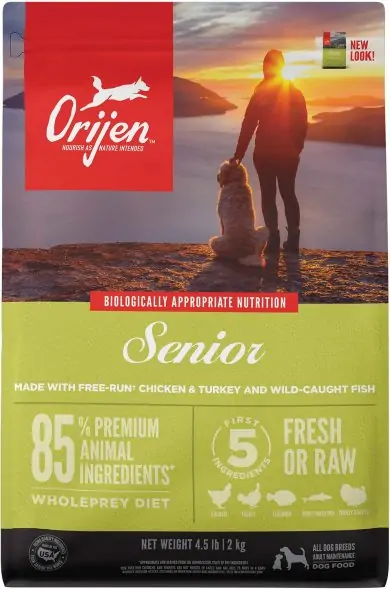
The Senior formula is one of 9 recipes included in our review of the Orijen product line.
Orijen Senior derives the bulk of its protein from chicken. Dry matter label analysis reveals the recipe contains 43.2% protein, 17% fat and 31.8% estimated carbs… with a fat-to-protein ratio of about 39%.
This recipe contains approximately 85% quality poultry and fish ingredients, providing a strong source of essential protein, vitamins and minerals. The nutrient-dense animal ingredients in this diet help support a senior dog’s joint, weight and immune health.
Read our review of the full Orijen Dog Food (Dry) range here
Main Ingredients Chicken, Turkey, Salmon, Whole Herring, Chicken Liver & Dehydrated Chicken Type Grain-free Protein Percentage 43.2 AAFCO Standards Maintenance Best For Dogs and senior dogs Sample buyer review...
Read more buyer reviews at Orijen.com"This is the best dry food that I have purchased for my 15 year old pup, that didn’t require me putting a topper flavoring. Yes, the smell is strong, but he loves the taste."
-
4. Open Farm
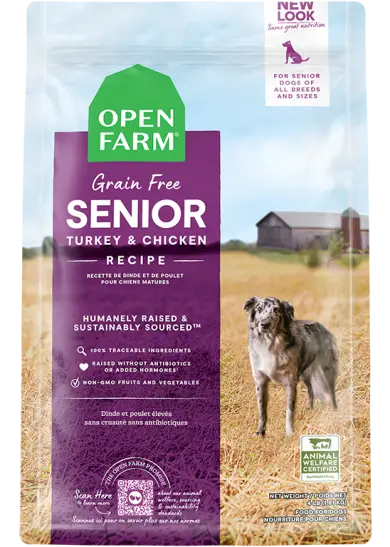
The Homestead Turkey & Chicken Senior recipe is one of 21 products included in our review of the Open Farm dog food.
Open Farm Homestead Turkey & Chicken Senior recipe derives the bulk of its protein from deboned turkey. Dry matter label analysis reveals the recipe contains 34.4% protein, 13.9% fat and 43.7% estimated carbs… with a fat-to-protein ratio of about 40%.
This nutrient-dense kibble helps support healthy joints and mobility in a dog’s later years due to a blend of turkey and chicken, New Zealand green lipped mussel and functional ingredients such as non-GMO sourced pumpkin and coconut oil.
Read our review of the full Open Farm Grain-Free Dog Food (Dry) range here
Main Ingredients Turkey (source of glucosamine and chondroitin sulfate), chicken (source of glucosamine and chondroitin sulfate), sweet potato, ocean whitefish meal & peas Type Grain-free Protein Percentage 34.4 AAFCO Standards Maintenance Best For Dogs and senior dogs Sample buyer review...
Read more buyer reviews at OpenFarmPet.com"Luka loves his food! We changed from a legacy brand to Open Farm and we noticed the difference. Luka is excited to eat his food! Also, his overall well-being improved. His hair shines, supports his active life and healthy weight. Open Farm’s customer service is great too! We definitely recommend it!"
-
5. Wellness Core
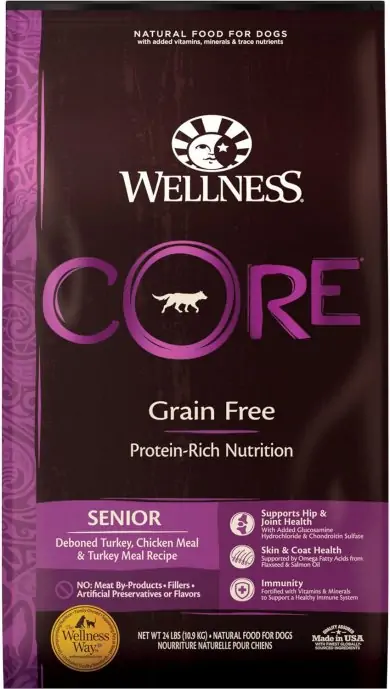
The Grain-Free Senior Deboned Turkey is one of 12 recipes listed in our review of the Wellness CORE product line.
Wellness CORE Grain-Free Senior Deboned Turkey recipe gets the majority of its protein from deboned turkey. Dry matter label analysis reveals the recipe contains 35.6% protein, 13.3% fat and 43.7% estimated carbs… with a fat-to-protein ratio of about 38%.
This recipe contains antioxidants, probiotics and taurine and is specially formulated to promote whole body health. It is fortified with glucosamine and chondroitin for joint and hip health along with premium protein sources and nutrient-rich superfoods.
Read our review of the full Wellness Core Dog Food (Dry) range here
Main Ingredients Deboned turkey, chicken meal (source of chondroitin sulfate), lentils, dried ground potatoes & peas Type Grain-free Protein Percentage 35.6 AAFCO Standards Maintenance Best For Dogs and senior dogs Sample buyer review...
Read more buyer reviews at WellnessPetFood.com"This is a very high quality dog food. My 16 year old flat-coated retriever has been eating Wellness Grain-Free her whole life and she is doing great!!! Highly recommend!"
-
6. American Journey
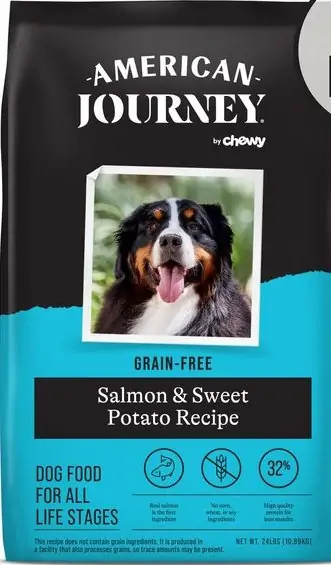
The Salmon & Sweet Potato is one of 17 recipes included in our review of the American Journey product line.
American Journey Grain-Free Dry Salmon & Sweet Potato recipe of its protein from deboned salmon. Dry matter label analysis reveals the recipe contains 35.6% protein, 15.6% fat and 40.9% estimated carbs… with a fat-to-protein ratio of about 44%.
It is made with salmon as the first ingredient, which provides amino acids to support lean muscles, energy and overall health and is packed with nutrient-dense ingredients for a balanced mix of vitamins, minerals and antioxidants.
Read our review of the full American Journey Grain Free Dog Food (Dry) range here
Main Ingredients Deboned salmon, chicken meal (a source of glucosamine and chondroitin sulfate), turkey meal, peas & sweet potatoes Type Grain-free Protein Percentage 35.6 AAFCO Standards All Life Stages Best For Puppies, adult dogs & senior dogs Sample buyer review...
Read more buyer reviews at Chewy.com"We have an American Bully and I have been trying different foods for a while but this one seems to be working better than the rest. He has a lot of allergies and that has caused some wounds from skin irritations."
-
7. Now Fresh
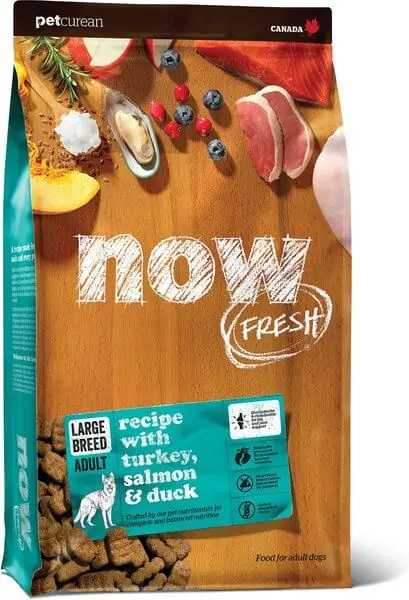
The Senior Recipe with Turkey, Salmon & Duck is one of 11 recipes included in our review of the Now Fresh product line.
Now Fresh Senior Recipe with Turkey, Salmon & Duck gets the majority of its meat protein from deboned turkey. Dry matter label analysis reveals the recipe contains 26.7% protein, 12.2% fat and 53.1% estimated carbs… with a fat-to-protein ratio of about 46%.
This grain-free dog food is made without by-product or meat meals, features omega-3 and -6 fatty acids and is crafted with only fresh de-boned meats and fish for protein. It also contains L-carnitine to support heart health and fat burning, while New Zealand green mussels provide chondroitin to support hip and joint health.
Read our review of the full Now Fresh Dog Food (Dry) range here
Main Ingredients De-boned turkey, peas, potatoes, potato flour & pea fiber Type Grain-free Protein Percentage 26.7 AAFCO Standards Maintenance Best For Dogs and senior dogs Sample buyer review...
Read more buyer reviews at Now Fresh"This brand was recommended to me when my Chocolate Lab Wilbur was a puppy. I have never changed his diet, other than add occasional sardines to top for a treat He is vital, healthy and going on 11 years. Only healthy pet visits, never had an issue with stomach issues, allergies or anything. I honestly believe it's the food. I changed him from puppy, to adult and now senior! No recalls! Peace of mind, still loves his Now."
-
8. Simply Nourish
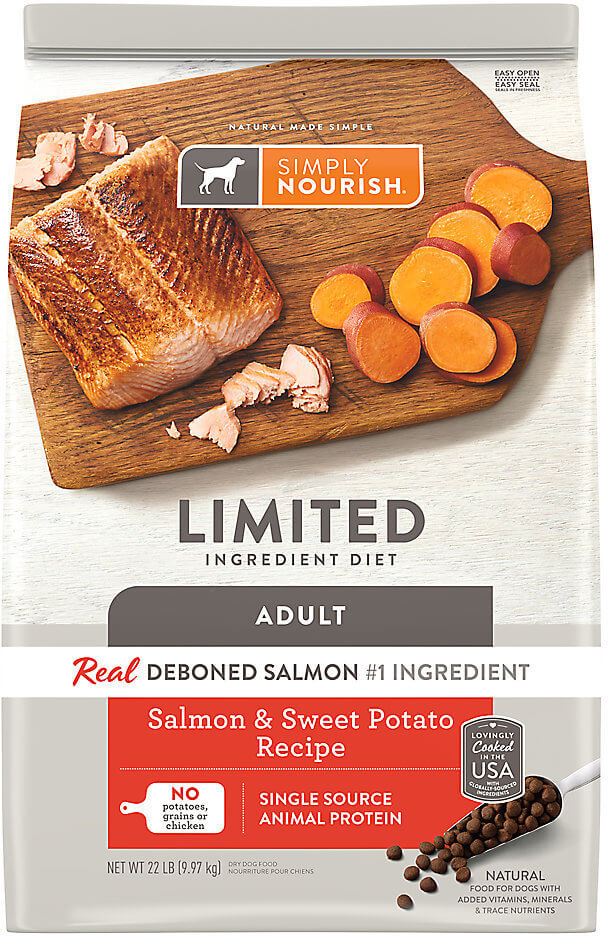
The Salmon and Sweet Potato recipe is one of 7 limited ingredient recipes included in our review of the Simply Nourish product line.
Simply Nourish Limited Ingredient Diet Senior Dry Dog Food – Salmon & Sweet Potato gets the bulk of its protein from deboned salmon. Dry matter label analysis reveals the recipe contains 28.9% protein, 10% fat and 53.1% estimated carbs… with a fat-to-protein ratio of about 35%.
This dog food includes natural sources of fiber such as sweet potatoes and peas to help support healthy digestion. By using deboned salmon as a single source of animal protein, this recipe helps reduce the chance of digestive sensitivities.
Read our review of the full Simply Nourish Limited Ingredient Diet Dog Food (Dry) range here
Main Ingredients Deboned salmon, dried sweet potatoes, salmon meal, dried peas & dried lentils Type Grain-free Protein Percentage 28.9 AAFCO Standards Maintenance Best For Dogs and senior dogs Sample buyer review...
Read more buyer reviews at PetSmart.com"I bought this because I wanted to try a senior food out for my 10 year old lab mix, and boy I'm glad I got it for him. His number twos have been a lot better thanks to the sweet potato, and he actually takes his time enjoying the food...even does a little dance for it."
More Top Picks
To view more top dog foods by category… click the link below that best meets your personal feeding needs.
Frequently Asked Questions
What are the symptoms of arthritis in dogs?
The common signs and symptoms of arthritis in dogs may vary depending on the severity and location of the joint affected. Here are some typical signs to look out for:
- Limping or favoring certain limbs: Dogs with arthritis often show lameness or have difficulty putting weight on one or more limbs. They may limp or exhibit stiffness in their gait.
- Stiffness and decreased mobility: Arthritic dogs may have trouble moving, especially after resting or during cold weather. They may be reluctant to jump, climb stairs, or engage in activities they previously enjoyed.
- Joint swelling and heat: Inflamed joints can become swollen, tender to the touch, and may feel warm. Your dog may display signs of discomfort or pain when you touch or manipulate the affected joints.
- Changes in behavior: Dogs with arthritis may exhibit changes in behavior due to pain. They may become more irritable, have decreased interest in exercise or playtime, or show signs of aggression when their painful joints are touched.
- Licking, chewing, or biting: Dogs may try to alleviate their discomfort by excessively licking, chewing, or biting at the affected joints.
- Muscle atrophy: Over time, the muscles around the arthritic joint may become weaker and visibly smaller due to decreased use and mobility.
- Loss of appetite and weight loss: Some dogs may experience a loss of appetite and subsequent weight loss, potentially due to pain or discomfort associated with arthritis.
How is arthritis diagnosed in dogs?
Diagnosing arthritis in dogs typically involves a combination of a thorough physical examination, a review of the dog’s medical history, and diagnostic tests. Here are the common steps involved in diagnosing arthritis in dogs:
Your veterinarian will conduct a comprehensive physical examination of your dog, evaluating their gait, joint mobility, and any signs of pain or discomfort. They will also discuss your dog’s medical history and any observed symptoms.
X-rays are commonly used to assess the condition of the joints and identify any abnormalities, such as joint damage, narrowing of joint spaces, or the presence of bone spurs. X-rays can help confirm the presence of arthritis and determine its severity.
In some cases, your veterinarian may recommend joint aspiration, which involves extracting a small amount of joint fluid for analysis. This can help identify inflammation, rule out other joint diseases, or detect underlying infections.
While there is no specific blood test to diagnose arthritis, blood tests can be helpful in ruling out other potential causes of joint pain and inflammation, such as infections or autoimmune disorders.
In some instances, additional imaging techniques such as ultrasound or MRI may be recommended to provide a more detailed assessment of joint structures, particularly in complex cases or to evaluate soft tissue damage.
Can arthritis be prevented in dogs?
Unfortunately, arthritis cannot be entirely prevented in dogs, particularly in cases where it is caused by factors such as genetics or developmental abnormalities. However, there are several measures you can take to reduce the risk or delay the onset of arthritis in your dog:
- Maintain a Healthy Weight: Obesity puts additional stress on joints, increasing the risk of arthritis. Keep your dog at a healthy weight through a balanced diet and regular exercise to minimize joint strain.
- Regular Exercise: Provide your dog with regular, low-impact exercise to promote joint mobility and strengthen surrounding muscles. Avoid high-impact activities that may cause excessive stress on the joints.
- Appropriate Nutrition: Feed your dog a well-balanced diet that supports overall joint health. Consider foods that contain joint-supporting nutrients such as glucosamine, chondroitin, and omega-3 fatty acids.
- Prevent Joint Injuries: Minimize the risk of joint injuries by ensuring a safe environment for your dog. Avoid activities or terrains that may cause excessive strain on joints, and be cautious during play or exercise.
- Regular Veterinary Check-ups: Schedule regular veterinary check-ups to monitor your dog’s joint health, especially as they age. Early detection and intervention can help manage arthritis or slow its progression.
- Joint Supplements: Consult with your veterinarian about the potential benefits of joint supplements for your dog. Some supplements, such as glucosamine and chondroitin, may help support joint health.
Are there any specific exercises or activities that can benefit dogs with arthritis?
Yes, there are specific exercises and activities that can benefit dogs with arthritis by promoting joint mobility, muscle strength, and overall well-being. However, it’s important to consult with your veterinarian before starting any exercise regimen to ensure it is appropriate for your dog’s specific condition and limitations.
Here are some exercises and activities that may be beneficial for dogs with arthritis:
- Low-Impact Walking: Regular, controlled walks on flat surfaces can help maintain joint mobility and muscle strength without putting excessive stress on the joints. Start with shorter walks and gradually increase the duration as tolerated.
- Hydrotherapy: Water-based exercises, such as swimming or walking in a shallow pool, can provide low-impact resistance and support joint movement. The buoyancy of water reduces the weight-bearing load on the joints while providing muscle strengthening benefits.
- Controlled Stair Climbing: Gentle stair climbing or walking up and down ramps can help improve joint range of motion and strengthen muscles. Ensure that the stairs or ramps are secure and that your dog can navigate them comfortably.
- Physical Therapy: Veterinary rehabilitation and physical therapy can offer targeted exercises and techniques, such as passive range-of-motion exercises, stretching, and therapeutic massage, to improve joint flexibility and reduce pain.
- Balance Exercises: Incorporate balance exercises using balance boards or cushions specifically designed for dogs. These exercises can help improve joint stability and coordination.
Always monitor your dog’s comfort levels during exercise and adjust the intensity or duration as needed. If you notice any signs of pain or discomfort during or after exercise, consult with your veterinarian for guidance. Remember, every dog is unique, and what works well for one may not be suitable for another. Individualized recommendations from your veterinarian will ensure the exercise plan is safe and effective for your arthritic dog.
Are there any supplements or medications that can help manage arthritis in dogs?
Yes, there are several supplements and medications available that can help manage arthritis in dogs. It’s important to consult with your veterinarian before starting any supplements or medications to ensure they are appropriate for your dog’s specific condition and to determine the correct dosage.
Here are some commonly used options:
- Glucosamine and Chondroitin: These are popular joint supplements that help support cartilage health and reduce inflammation. They are often used together and can be found in various forms, including tablets, chewable treats, and liquid formulations.
- Omega-3 Fatty Acids: Omega-3 fatty acids, usually derived from fish oil, have anti-inflammatory properties and can help reduce joint inflammation and improve mobility. They can be given as supplements or incorporated into the dog’s diet.
- Nonsteroidal Anti-Inflammatory Drugs (NSAIDs): NSAIDs, such as carprofen, meloxicam, or deracoxib, are prescription medications that help reduce pain and inflammation in arthritic dogs. These medications should only be used under veterinary supervision due to potential side effects, and regular monitoring is necessary.
- Adequan: Adequan is an injectable medication that contains polysulfated glycosaminoglycan (PSGAG), which helps support joint health by promoting cartilage repair and reducing inflammation. It is typically administered as a series of injections under veterinary guidance.
- Steroids: In some cases, corticosteroids may be prescribed to manage arthritis flare-ups and reduce inflammation. These medications should be used judiciously and only under veterinary supervision due to potential side effects.
- Prescription Diets: Some veterinary prescription diets are formulated to support joint health and manage arthritis in dogs. These diets often contain specific nutrients, such as omega-3 fatty acids, glucosamine, and chondroitin, to promote joint function and reduce inflammation.
It’s important to note that every dog’s condition is unique, and not all supplements or medications may be suitable or effective for every dog. Your veterinarian will assess your dog’s specific needs and recommend the most appropriate treatment plan, which may include a combination of supplements, medications, and other management strategies tailored to your dog’s condition.
What can I do to help manage my dog's weight and reduce joint strain?
Managing your dog’s weight is crucial for reducing joint strain and managing arthritis. Here are some tips to help you in managing your dog’s weight and minimizing joint strain:
Consult with your Veterinarian: Your veterinarian can assess your dog’s current weight, body condition, and provide specific recommendations for a healthy weight range. They can also help determine the appropriate amount of food and feeding schedule for your dog.
Balanced Diet: Feed your dog a balanced and nutritious diet that is appropriate for their age, size, and activity level. Choose high-quality dog food that provides essential nutrients without excessive calories. Avoid overfeeding or feeding high-calorie treats.
Portion Control: Measure your dog’s food portions carefully to avoid overfeeding. Follow the feeding guidelines provided by the dog food manufacturer or consult your veterinarian for specific recommendations.
Weight Loss Diet: If your dog is overweight, your veterinarian may recommend a weight loss diet. These diets are formulated to be lower in calories while still providing essential nutrients. They can help your dog safely lose weight and reduce joint strain.
Avoid Table Scraps: Resist the temptation to feed your dog table scraps or human food. These can be high in calories and contribute to weight gain. Stick to a healthy, balanced dog food diet.
Regular Exercise: Engage your dog in regular exercise that is suitable for their condition. Low-impact exercises, such as walking, swimming, or controlled play sessions, can help maintain muscle tone and joint mobility without placing excessive stress on the joints. However, consult your veterinarian to determine the appropriate exercise routine for your dog’s specific needs and limitations.
Environmental Modifications: Make your home environment conducive to weight management. Provide a safe, comfortable space for your dog to rest and sleep. Consider using ramps or stairs to help them navigate furniture or elevated surfaces, reducing strain on joints.
Treats and Rewards: If you use treats for training or rewards, choose low-calorie options or use a portion of your dog’s regular food instead. Avoid excessive treat-giving, as it can contribute to weight gain.
Regular Weigh-Ins: Monitor your dog’s weight regularly by weighing them at home or scheduling regular weigh-ins at your veterinarian’s office. This will help you track their progress and make adjustments to their diet and exercise routine as needed.





